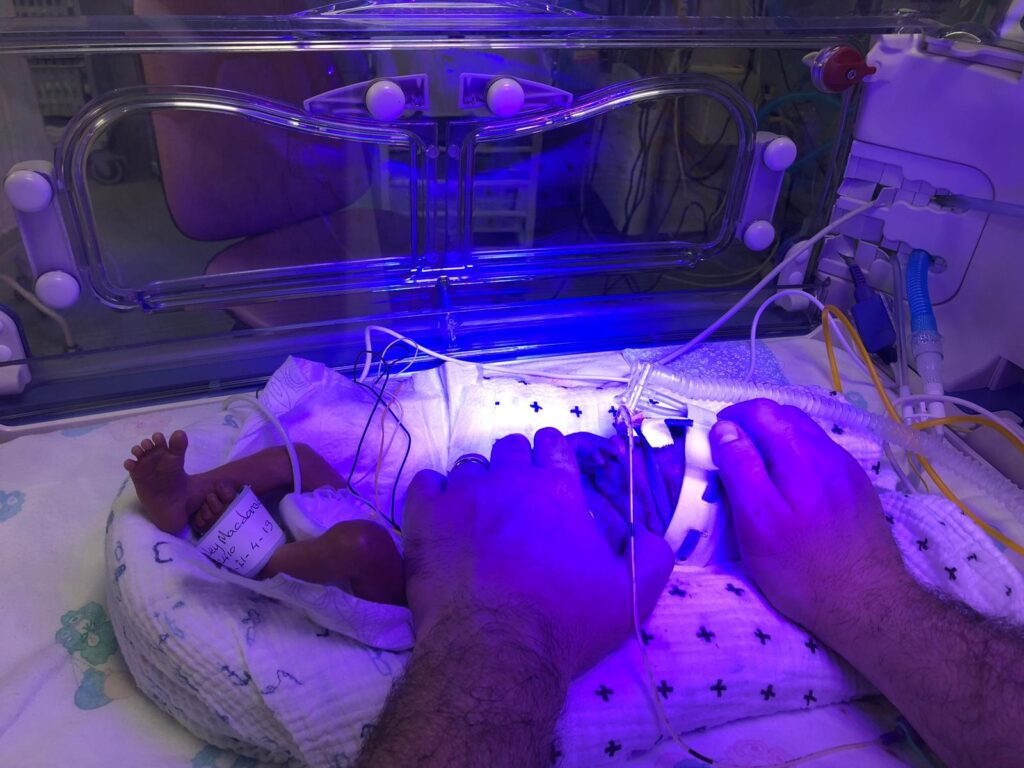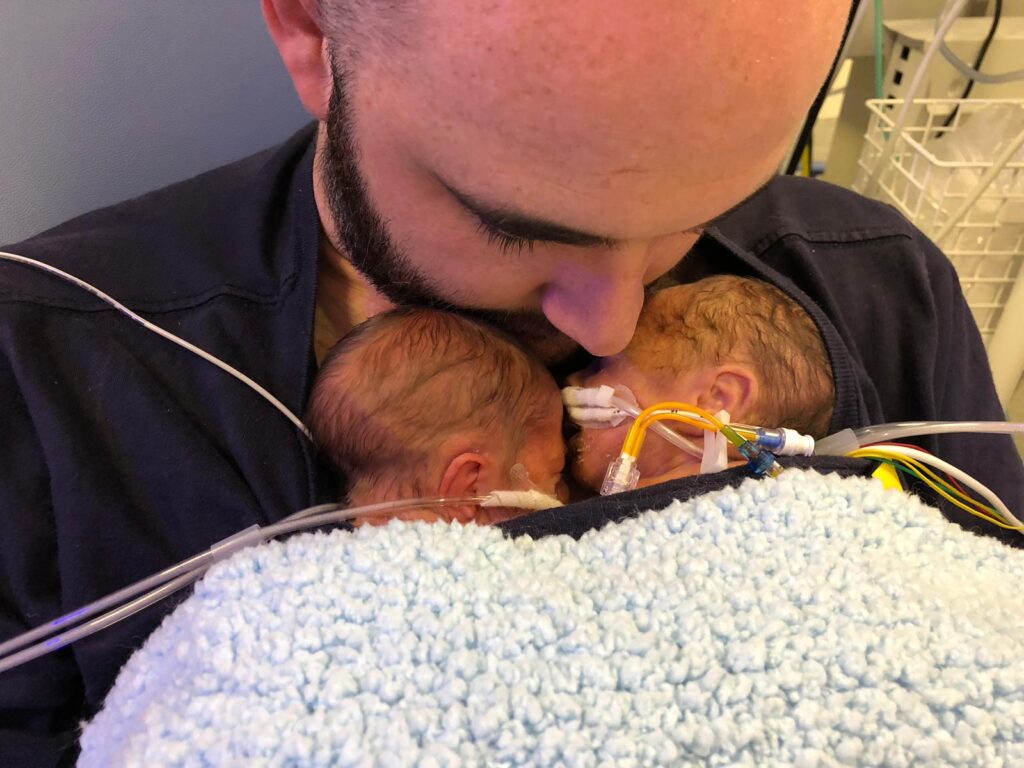There’s no doubt about it: bonding with your baby when they’re in an incubator is hard.
Of course, the mother’s role is imperative. She can provide the all-important breast milk to help your child on its road to recovery.
However, dads shouldn’t feel as though they have to play second fiddle all the time. There are plenty of ways you can help out and bond with your baby, even if they are in a neonatal ward.
In this post I’ll cover eight ways that dads can get involved in the NICU experience and start building a relationship with their newborns.
The moment I landed in planet NICU to see our boys, I had no idea what to do. I couldn’t take my eyes off all the wires and machines.
Then came an overwhelming feeling of dread; how was I going to build a bond with them when they were cooped up inside a Perspex box?
How the hell can you be a dad through two tiny little portholes of an incubator?
Gradually, though, I learned that it is possible – you just have to adapt to the situation. Here are eight ways you can bond with your baby in the neonatal unit.
1. Read them a book
Reading to your baby can help with their brain development and sets the foundations for their language and speech development. This is particularly important for preterm babies, as they’re at higher risk of language development delays.
Studies have also shown that reading to your baby in NICU can be beneficial for parents, helping to relieve some of the stress associated.
We found that both units our boys were on had a selection of books that had been donated and available for parents or family members to borrow and read to their children.

It’s a good habit to get into, as well. Reading is important for any child’s development and learning as they grow, so there’s no better time to start!
2. Sing to your baby
When a NICU nurse advised singing as a form of relationship-building, I smiled in acknowledgment to hide my inner dismay. But, like reading, simple harmonies and lullabies can have a big impact on your baby’s development.
In all honesty, I rarely did it unless alone – particularly towards the end of our hospital stay when the boys had the luxury of their own room. However, my wife sang regularly – and still reprises the same ditties to this day, much to the boys’ pleasure.
For what it’s worth, my weapon of choice when I did burst (a term to be taken with a pinch of salt here) into song was this psychedelic number by my favourite band, Kasabian:
3. Talk to your baby
It can feel pretty weird singing to a baby through a box… in fact, I’m not a fan of singing at all outside of the comfort of my own home. So before I had the balls to do it (quietly), I opted just for talking.
As mentioned above, talking and interacting with your baby is really important, as it helps to form connections in the brain.
Your voice can be a source of comfort. Your baby already recognises it from when they were in utero, so it’s important to keep talking to them throughout their NICU stay to continue developing that relationship.
Any kind of chat will do; I tried to offer reassurance while changing nappies and feeding, as well as explaining to them the importance of the Scunthorpe United match every Saturday (which invariably ended in defeat).
4. Comfort them with containment holding
The odd thing about the NICU experience is that your baby seems to spend half its time trying to become accustomed to the world, and the other half curled up in darkness as the nurses try to recreate the in utero experience.
Containment holding (also known as hand containment) can help your baby because it acts like the boundaries they’re used to. The incubator gives them more space to stretch but this can be unsettling – especially considering they should still be in the womb.
By gently placing your hands over your baby’s body, you can provide them with reassurance and act as a calming influence. I remember doing this when our sons were having any kind of examination or test as a way of reassuring and calming them.

You can take comfort yourself from the fact that your baby is being reassured by your presence.
5. Kangaroo care (skin-to-skin)
When the neonatal nurses started talking about kangaroo care, I was confused. Had I arrived at a zoo instead of the hospital?
Turns out it’s just another way of saying “skin-to-skin” contact. This is (probably… surely) the most important thing you can do to bond with your baby in NICU.
A bit like a joey would occupy its mother’s pouch, kangaroo care involves having your baby upright on your front, usually down your top or beneath a blanket.
It’s done when your baby is stable, and it can help them in a number of ways. Studies have shown that kangaroo care can have several health benefits, including reducing the chances of infection and illness, as well as reducing the length of the hospital stay.
Importantly, it also relaxes your baby and gets them used to you. From personal experience, it can be a very relaxing and euphoric experience for parents, too.

Dads actually do have one special superpower in this situation – having skin-to-skin can help to reduce your baby’s stress levels, and may also help to improve their sleeping patterns. A study also found that fathers who take part in skin-to-skin contact feel more attached to their baby than those who don’t.
By the way, if you have twins, kangaroo care is a lovely way to get them together and enjoy each other’s company as well as yours. Take advantage while you can – there’ll soon come a time when they’re too big to hold together!
6. Help with the care routines
I was amused by the fact the NICU washing and changing routine is referred to simply as ‘cares’.
Anyway, this is another great bonding opportunity for parents. Like many dads, I’d never changed a nappy in my life until my sons were born. I can’t say it was ever high on my list of priorities, but I certainly didn’t expect to be doing it half-blind and under such pressure.
I had to undo, wipe, remove, replace, and do up all with both hands through a small porthole. Not only that, but the nappy seemed to serve as a makeshift belt where all the wires were tucked neatly – it almost felt like disarming a bomb.
My first few attempts were pretty ropey, but with the help of the nurses (who, it seemed, could do it with their eyes closed), I soon cracked it.
Cares can also include ‘mouth care’, where breast milk or sterilised water is used to clean our baby’s mouth. You may also be able to help out with changing their bedding or their clothes, once they start wearing them.
7. Get involved with feeds
If your partner is expressing, it can feel as though you’re a bit of a spare part when it comes to your child’s nourishment. However, the nurses are generally more than happy for (and in fact will encourage you) to feed your baby.
Feeding time in the neonatal unit is not like what you might’ve envisaged before your baby was born – certainly to start with. There are no bottles and teats, just containers of mum’s expressed milk or formula.
To start with, your baby will probably be fed hourly, and this will gradually become every two and then every three hours, as their milk tolerance (and tiny tummy) grows.
Hilariously, our sons’ early days saw them entitled to a colossal half a millilitre of milk every hour. 12 whole mls every day.
Parents can usually help out with feeds. Early on, we were shown how to check our lads’ gastric pH levels to ensure the feeding tube was in the correct position.
Then, we were taught how to tube feed. A syringe is connected to the nasogastric tube (feeding tube) which enters your baby either via the nose or mouth. And once your milk is in the syringe, you just gently hold it aloft and let gravity take the milk directly to your baby’s stomach.
I found feeds to be a great way of bonding with my sons in the early days. Yes, my wife had provided the elixir, but it felt good for me to be able to feed the boys with it.
As they developed and neared discharge, we also introduced bottle feeding which again allowed me to have that all-important contact.
8. Bathe your baby
As your baby nears discharge (particularly if they’ve spent a long time in hospital), you might get the opportunity to give them a bath.
My wife and I grabbed at this chance as we felt it gave us the chance to build further trust with our sons. And get some much-needed practice in.
There was some comedy in the fact they we bathed them in little storage boxes. I don’t think the boys were particularly amused by the experience, but it was a nice bonding moment all the same.
Oh, and we got a soaking, so prepare for that.
Remember: it’s hard, but not impossible
There are times when you feel as though you simply can’t bond with your baby. There’s little intimacy or freedom.
There’s never a moment when your child isn’t under the watch of a healthcare professional. There are usually other parents in the vicinity, if not the room.
It can be difficult to build a relationship, especially when you can’t scoop up your baby to soothe them if they’re crying or hungry.
Despite that, it is possible. Part of the neonatal experience is learning to adapt and realising that nothing is as you expected it to be.
Are you currently on NICU with your little one(s). Download this free checklist and tick each activity off as you go.
4 replies on “12 min read8 ways for dads to bond with their baby in neonatal care”
Great stuff Carl, really interesting read. Juicy snippet opportunity too 😂
Haha cheers mate… added a sprinkle of SEO 👀
[…] All of this while you try to bond with your neonatal baby. […]
[…] there was some chance to bond with my sons, it was sandwiched between doses of bad news, torturous procedures and intense periods of […]